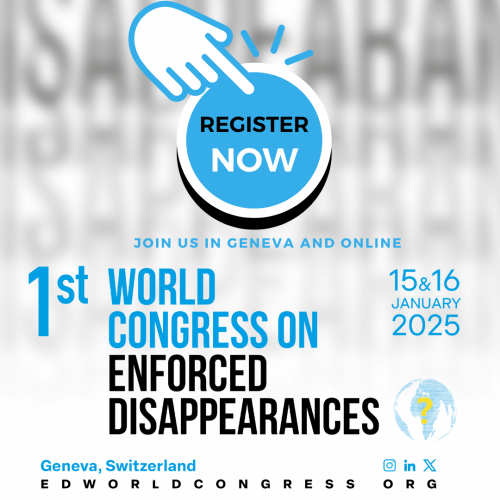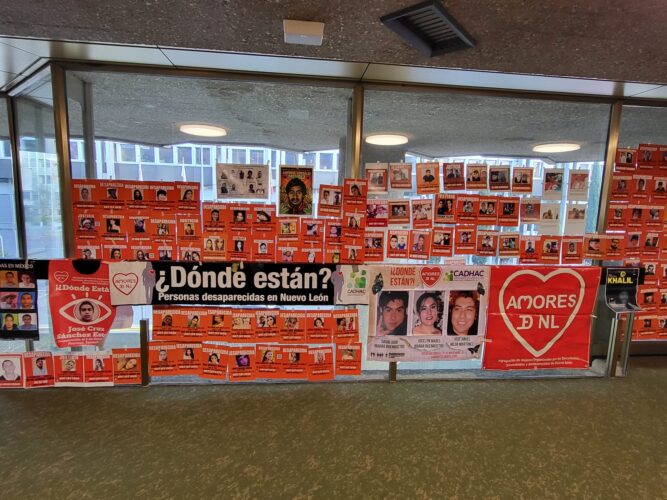
https://www.icj.org/world-congress-on-enforced-disappearance-preventing-...
Although the crime of enforced disappearance remains a widespread practice in several countries, in all regions of the world, accountability for the perpetrators and justice for the victims and their loved ones is still, too frequently, lacking.
The crime of enforced disappearance is a particularly serious human rights violation, in that it is typically composed of multiple component violations, including torture or cruel, inhuman or degrading treatment; arbitrary detention; extrajudicial killing. At its heart is a denial of the recognition of a person before the law.

Following decades of mobilization to prevent and eradicate this heinous human rights violation, the UN International Convention for the Protection of All Persons from Enforced Disappearance (the Convention) was adopted in 2006 following a concerted effort of States, associations of victims, human rights non-governmental organizations and experts. The ICJ played a leading role in both advocating for the initiation of and in contributing to the drafting process.
Over the past 15 years, the number of States Parties to the Convention has increased from 20 to 76. While this constitutes progress, it is far from enough, and implementation has been incomplete even among States Parties.
Through various legal interventions and advocacy, the ICJ has helped demonstrate that pre-existing international law, while de facto prohibiting enforced disappearances, did not adequately capture the full scope and severity of the crime, and left victims and survivors without access to justice and effective remedies.


The ICJ has continued to advocate for the implementation of the Convention in various countries around the world. A major challenge all along has been that States that do not have a current or historic experience with enforced disappearances have not necessarily given priority to action. It is through efforts like the important Congress on Enforced Disappearances that we hope to change these dynamics.
* CEDI is a multi-stakeholder organization of whom the ICJ is a partner, created to facilitate new synergies to fight against enforced disappearance.
Congress Highlights

The 1st World Congress on Enforced Disappearances (WCED) kicked off with an opening ceremony moderated by ICJ Senior International Legal Adviser in South Asia Mandira Sharma and United Nations Committee on Enforced Disappearances (CED) Chairperson, Prof. Olivier de Frouville.
Moving testimonies from the families of enforced disappearance victims all over the world led to reflections on the hard challenges posed by this terrible crime and the resulting impunity. The Congress heard the pain expressed by the victims and their families, and how such trauma is shared by society as a whole, not just the individuals affected.

As ICJ Secretaty-General Santiago A. Canton underscored, “the lack of political will is the main challenge to address the issue of enforced disappearances. States must have the will to look into it and fight against impunity.”

The ICJ-led panels on The Fight Against Impunity: Ensuring International Accountability of Perpetrators of Enforced Disappearance were moderated by Sandra Epal-Ratjen, ICJ International Advocacy Director, and Ian Seiderman, ICJ Senior Legal and Policy Director.

Panelists included:
- Olivier DE FROUVILLE, UN Committee on Enforced Disappearances (CED), Chair, France
- Eugénie VENDROUX, Université of Paris 2 (Panthéon-Assas), Doctoral Student, France
- Reed BRODY, International Commission of Jurists (ICJ), Commissioner, USA
- Ward FERDINANDUSSE, Kosovo Specialist Prosecutor’s Office, Deputy Specialist Prosecutor, Netherlands
- Nazhat Shameem KHAN, International Criminal Court (ICC), Deputy Prosecutor, Fiji (via video address)
- Ana SROVIN CORALLI, The Geneva Graduate Institute, Slovenia
- Robert PETIT, Impartial and Independent Mechanism for Syria (IIIM), Head, Canada
- Ilya NUZOV, International Federation for Human Rights (FIDH), Head of the International Justice Desk– Global Initiative Against Impunity (GIAI), Member
- Kate VIGNESWARAN, International Commission of Jurists (ICJ), Director, Global Accountability Initiative, Netherlands/Switzerland


They addressed various dimensions of the crime of enforced disappearance and strategies to ensure they are thoroughly and impartially investigated, and perpetrators brought to justice. Panelists highlighted that the crimes remained widely unprosecuted, with related charges largely absent from indictments, even where a factual basis for them is present.
Panelists discussed the broader challenges for holding perpetrators of enforced disappearance accountable, as well as existing and emerging solutions to address them.

ICJ Commissioner and longtime prosecutor of atrocity crimes Reed Brody shared his experience as a human rights lawyer:
“The nature of enforced disappearances as a continuing crime, which continued after Chile’s amnesty law was adopted and after Chile ratified the torture convention, was crucial to the cases against former dictator Augusto Pinochet – both in the United Kingdom and then in Chile. Enforced disappearances were also a central part of the prosecution and conviction in Senegal of the former Chadian dictator Hissène Habré. The enforced disappearances in The Gambia of the citizens of six ECOWAS countries contributed to the political will in West Africa to establish a hybrid court between The Gambia and ECOWAS to prosecute the worst crimes of the Yahya Jammeh era.”
During the panel “Strengthening Search Processes: Key Lessons and Pathways for Effective Search” moderated by UN CED Member Carmen Rosa Villa Quintana and ICJ Commissioner Wilder Tayler, former ICJ Deputy Secretary General Federico Andreu-Guzmán, currently International Litigation Coordinator, Colombian Commission of Jurists (CCJ) took the floor.

Federico Andreu-Guzmán, who during his tenure at the ICJ actively contributed to the drafting of the UN Convention Against Enforced Disappearances, shared with the audience some lessons learned from the Colombian experience in the search for disappeared persons:
“Extrajudicial search is an experience that strengthens judicial search. In the Colombian experience, extrajudicial humanitarian search for victims is fundamental because the system does not respond effectively to these needs.
In addition, the role of family members in the judicial search process is limited, whereas their experience is incorporated into the extrajudicial process as an integral part of search, investigation and localization until release and reunion, whenever possible. Family members need to be involved in the whole process, because they better than anyone know where to look for the disappeared.
And there’s yet another dimension: it is the State’s obligation to ensure the search for truth in order to achieve justice, but that implies participation. To fulfill this inalienable right, which is imprescriptible, justice and search for truth must be integrated with one another.”
Legal Resources for practitioners on enforced Disappearance
Practitioners guide 9:
Practitioners guide 10:
Related Links and Social Media
https://www.icj.org/wced-1st-world-congress-on-enforced-disappearances/
https://www.linkedin.com/feed/update/urn:li:activity:7285264784583766016
https://www.linkedin.com/feed/update/urn:li:activity:7285385109887680513
https://www.linkedin.com/feed/update/urn:li:activity:7286072921515589632
https://www.linkedin.com/feed/update/urn:li:activity:7285266561911648259
https://www.instagram.com/reel/DEh-prkIxpz/?utm_source=ig_web_copy_link&igsh=MzRlODBiNWFlZA==









